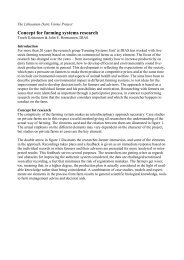Bladet - Det Jordbrugsvidenskabelige Fakultet, Aarhus Universitet
Bladet - Det Jordbrugsvidenskabelige Fakultet, Aarhus Universitet
Bladet - Det Jordbrugsvidenskabelige Fakultet, Aarhus Universitet
Create successful ePaper yourself
Turn your PDF publications into a flip-book with our unique Google optimized e-Paper software.
Climate changes<br />
– should we take them seriously?<br />
Basically, nature has never been static but is constantly undergoing<br />
changes. It is high time that we consider how we want<br />
to handle nature preservation in a dynamic environment.<br />
By research professor Jørgen E. Olesen, Department of Agroecology,<br />
Research Centre Foulum (page 6)<br />
The truth is that climate change is real and will worsen the<br />
other global problems.<br />
20-30 years ago much of the debate regarding climate<br />
change was concerned with the fear of a new ice age. This<br />
fear can turn out to be exaggerated, perhaps not least due<br />
to agriculture. Our influence began long before we started<br />
using fossil fuels.<br />
The climate changes created by humans can prohibit a new<br />
ice age. Since a global cooling, which an ice age would cause,<br />
is much more serious than a moderate warming, then global<br />
warming can also have a positive effect in the long run, by<br />
preventing cooling. As disclosed in the recent Stern-report<br />
from the British government, the expected global warming<br />
will, however, have huge negative repercussions for the world<br />
economy, especially in the warm countries where developing<br />
countries already have trouble making ends meet.<br />
The concept of climate change also challenges our ideas<br />
about a stable environment, which is one of the basic axioms<br />
of nature preservation. Basically, nature is never static, but<br />
always undergoing changes.<br />
It is high time that we consider how we want to handle nature<br />
preservation in a dynamic environment. We must speculate<br />
if some types of nature are impossible to save in their<br />
present locations and if we should instead ensure that they<br />
are established elsewhere.The same kinds of considerations<br />
are relevant with regard to the effect of agriculture on the<br />
environment.<br />
Mozart in the corridors<br />
Wireless network will be introduced to DIAS next spring.<br />
The man behind the scene has for quite a while been wearing<br />
out his shoes in the corridors of Research Centre Foulum<br />
with his computer tuned in to Mozart and the P1 radio<br />
programme.<br />
By Søren Tobberup Hansen (page 2-3)<br />
Denmark’s Radio’s P1 music via the internet has been a faithful<br />
companion to Ole Rahn of late. He is our it-security expert<br />
and it is his job to introduce a wireless network in the<br />
corridors of the research centres of DIAS. Introduction of<br />
the network requires many long treks with a small, portable<br />
computer connected to the wireless network.<br />
– Once each access point was established in the corridors<br />
and the meeting rooms, I have gone around and tested the<br />
network with my computer to ensure that it works everywhere<br />
inside the buildings. I have done it by listening to music<br />
on the internet radio.<br />
- If the music vanishes or starts to break up I can adjust immediately<br />
at the individual access points, Ole Rahn explains.<br />
- With the network, many of our guests will be able to access<br />
their own data via the Internet and not have to use our<br />
internal net.That will make it possible for guests to fetch, for<br />
example, data files and presentations, or read e-mails, when<br />
they are attending meetings at DIAS, says Ole Rahn.<br />
Ole Rahn expects that he will have established the wireless<br />
network at all research centres by the end of spring.<br />
In those spots where many users are expected, extra access<br />
points will be set up to ensure that all who should so desire<br />
can gain access to the wireless net.<br />
Personalebladet nr. 6 · 2006



